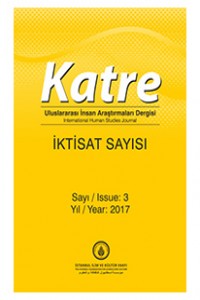Abstract
mphasizing on the types of governments that impede freedom, questions are raised with respect to how people will be able to overcome these adverse conditions.
A discussion has been made on the question concerning the possible alleviation of negative conditions people faced (and are facing) through previous and present times such as slavery, thrall and the exploitation of human labor. It can be argued that Nursi sees the alleviation of these problems as part of an evolution process, and pointed out that the only way to succeed comprehensively would be via the reaching and attainment of the “Ownership and Liberty Era”.
The different forms of social life are examined in three sections by emphasizing the eras which appeared in the adventure of human life through the lense of the Nursian framework. The first of these eras is named the “Primitive Communal Society” and Marx referred to it as the “Nomadic and Savagery Era”. The second era is called the “Slavery and Colonial Era” and the third era is the “Ownership and Liberty Era”. Slavery and the Colonial social order are studied in three sections, the first is basic slavery, the second is the thrall under the feudal order and the third is capitalism that is defined by its wage system.
References
- iktisat risalesi
Abstract
İnsan ve toplum hayatı tarihsel süreç ve Bediüzzaman Said Nursi’nin eserlerinden yola çıkılarak incelenmiş kölelik sonrası dönemin «Malikiyet ve Serbestlik» isimli yeni bir dönem olacağı değerlendirilmiştir.
Toplumun yeterince özgürleşememe sebepleri, çalışma ve yönetim şekilleri üzerinde durularak ele alınmış insanların bu olumsuz şartlardan kurtulabilmesinin yolları araştırılmıştır.
Gelişim süreci içinde insanlığın başına gelen kölelik, esaret ve insan emeğinin sömürülmesi gibi olumsuz şartların bir gün mutlaka ortadan kalkacağı öngörülmüş gelmesi düşünülen bu devrin “Malikiyet ve Serbestiyet Devri” olması gerektiği izah edilmeye çalışılmıştır.
İnsanın yaşam serüveninde ortaya çıkan dönemler birbirinden farklı sosyal yaşam biçimleri ile üç bölümde ele alınmıştır. Bunlar Kölelik Öncesi Dönem, Kölelik ve Sömürü Dönemi, Kölelik Sonrası Dönemdir.
İnsanın yaşadığı bu devirler incelenerek toplumsal formasyonun en gelişmiş düzeyi olarak Kölelik Sonrası Dönem, diğer bir deyişle “Malikiyet ve Serbestlik Devri” ileri sürülmüştür. Mülkiyet haklarının önem kazandığı ve her konuda tam bir özgürlüğün yaşanacağı bu dönemde mülkiyet, sahip olma ve hürriyet kavramları üzerinde yoğunlaşılarak özgün bir bakış açısı geliştirmeye çalışılmıştır.
Hürriyet ve özgürlük kavramlarının insanın çalışma hayatına ve sosyal yapısına olan etkileri incelendikten sonra çalışmanın diğer önemli bir konusu da “Kayıtdışılık” olarak ele alınmış bunun ülkelere yüklediği maliyetler göz önüne alınarak mülkiyet sisteminin önemi vurgulanmıştır. Bu sayede gelecekte daha fazla önem kazanacağı düşünülen mülkiyet ile ilgili kavramların yanı sıra yeni bir dönemin ana parametreleri tespit edilmiştir.
Keywords
References
- iktisat risalesi
Details
| Primary Language | Turkish |
|---|---|
| Subjects | Religious Studies |
| Journal Section | Refereed Articles |
| Authors | |
| Publication Date | June 1, 2017 |
| Submission Date | June 1, 2017 |
| Published in Issue | Year 2017 Issue: 3 |

Katre International Human Studies Journal is open access journal under the CC BY-NC license (Creative Commons Attribution 4.0 International License)
Based on a work at https://dergipark.org.tr/en/pub/katre
E-mail: katre@iikv.org

